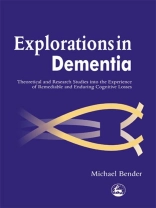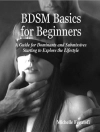Based on the findings of in-depth research and on the author’s long-standing experience of working with people with dementia, this ground-breaking book provides fresh perspectives and ideas for policy and practice. In the first part of this extensively referenced and up-to-date book, Michael Bender examines the scientific status of the terms ‘dementia’, ‘Alzheimer’s’ and ‘multi-infarct dementias’ and concludes that there is little convincing scientific evidence to justify their continued use. He suggests that in order to develop adequate psychological and social models of dementia, a number of perspectives, such as the intrapsychic, the interpersonal and the contextual, need to be developed.
Drawing on contemporary theoretical concepts including multiple selves, personal construct theory, intrapsychic survival and the effect of historical and political factors on older people’s well being, the author calls for a more positive and constructive approach to improving the lives of people with dementia. He emphasises the importance of the individual’s social context; the problems they are facing and their reactions to those problems; their life history and interpersonal relationships and discusses the process of assessment, finally developing techniques that allow the person with dementia to describe their experience, helping to ameliorate cognitive losses.
Taking an honest look at what we really know about dementia and how we can learn more, this innovative book will make essential reading for medical and mental health practitioners, researchers and students working in the field.
Table des matières
Introduction. Part I: The Scientific Status of the Standard Paradigm and its Implications. 1. The Scientific Status of the Standard Paradigm. 2. How is the Standard Paradigm Maintained? 3. The Effects of the Paradigm: The Rise of Memory Clinics. Part II: A Framework for Understanding the Individual. 4. How Can we Understand the Person Who is Experiencing Cognitive Loss(es)? Part III: Perspectives of Understanding. 5. Old in Britain Today. 6. Psychosocial Explanations of Disorientation. 7. Difficulties and Problems, with Sally Robbins. 8. Cycles of Negotiation. 9. The Context of Assessment: Before the Professionals. 10. The Client’s Position. 11. Insight, `Inconsistency’ and Selves. 12. Interpersonal and Intrapsychic Survival, with Sally Robbins. Part IV: Futures. 13. In Practice. 14. Ways Forward. 15. Entrances and Exits. Appendices. References. Index.
A propos de l’auteur
Michael Bender is a consultant clinical psychologist and Head of Psychological Services to Older Adults in Plymouth Primary Care Trust. He lectures and publishes extensively on the psychology of old age and dementia, and is co-author of Understanding Dementia: The Man with the Worried Eyes, also available from Jessica Kingsley Publishers.












